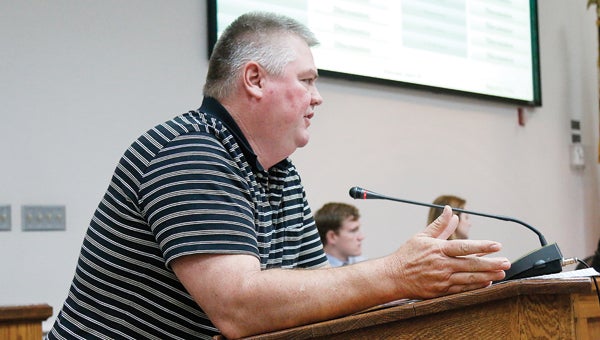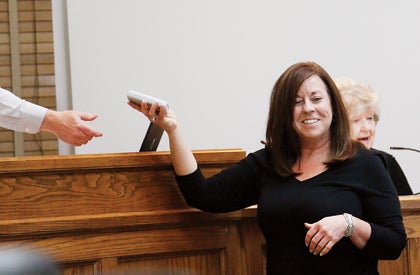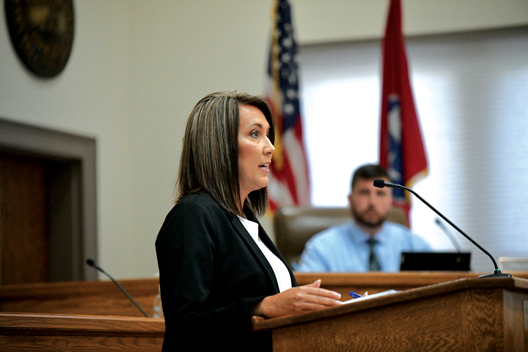New campground regulations approved; Commissioner elected to 8th district seat
Published 12:53 pm Tuesday, April 19, 2016

Star Photo/Rebekah Price
Carter County resident Steve Stevenson, who plans to open a campground with his wife and children on their 11-acre property Roan Mountain, was happy to see the new regulations approved by the Carter County Planning Commission to alleviate restrictions on spacing and setbacks.
Steve and Katarina Stevenson purchased 11 acres in Roan Mountain in May 2015, with the dream of opening a campground with on-site activities and tour excursions throughout the county.
However, they found the campground regulations established in 2010 would be too restrictive for them to offer a sufficient amount of space to make their business thrive.
Steve wrote a letter to the editor of the Elizabethton Star stating they would only be able to accommodate 10 RV campsites, three cabins and no primitive campsites.
After months of addressing this issue, petitioning commissioners, meeting with the Carter County Planning Director Chris Shuettler, researching the economics of regional tourism and developing their business model, the Stevensons were relieved to find the Carter County Commission approved a new ordinance with less restrictive language in a vote of 22-1-1.
The changes between the old ordinance and the new one include:
• Space between campsite and nearest adjoining residence is now 200 feet, reduced from 300 feet.
• Minimum required acreage was reduced from four to two.
• Space between campsites was reduced from 50 feet to ten feet.
• The street width is the same, but the gravel depth for parking spaces was reduced from six inches to four inches.
• 20 full-service sites will be allowed per acre or 30 primitive sites, where no primitive sites were previously allowed.
Katarina addressed the commission speaking of the economic impact this could have for the county.
“They found that in 2013, Carter County ranked number 40 in the state of Tennessee in terms of tourist spending, yet two of our neighboring counties are in the top ten,” said Katarina.
On top of providing more accommodations for tourists, the Stevensons plan to host on-site activities like zip lines, hiking trails, hammock sites, fishing opportunities, nature classes, disk golf, volleyball, outdoor movie nights and potluck dinners.
“In addition to being a campground, Wilderness Landing is going to be an experience, one that children and adults will remember and return to,” Steve said.
He said they also plan to take guests on excursions to such area amenities as the Tweetsie Trail, Rhododendron Festival, Sycamore Shoals State Park, Historic Tours, skiing and other opportunities.
“You guys are to be commended for recognizing Carter County as an investment,” said Commissioner Mike Hill. “We need a lot more of that sort of mentality…I think your plan is very sound.”
Since the change to the regulations in 2010, Schuettler said no new campgrounds had been granted permits as a result of the regulations. He said one woman wanted to open one on inherited property, but her property was about half an acre too small. He said she is subdivide it and selling it.
Katarina and Steve provided some numbers about the economic impact of tourism, saying they believe the campground will facilitate a significant increase in spending at other area businesses.
Steve reference a Tennessee Department of Tourism Development Commission study which found a tourist who spends $40 for a night of lodging will likely spend another $230 in the rest of the county.
Katarina said that spending on lodging amounts to only 17-18 percent of a tourist’s total spending, according to a study called the Common Impact of Travel in Tennessee Counties.
“If we kept our sites rented for 180 days per year…that would generate more than $300,000 for other businesses in the county,” Katarina said. “With new regulations, we would be able to put in 20—possibly a few more campsites than that—that would more than double the revenue for the area.”
She said they also want to create jobs at their campground to create a greater economic impact.
“We believe our business is exactly what the county needs to bring tourists here and to keep them here so that they will provide revenue to the county,” Steve said.
Steve said they have named the Campground “Wilderness Landing,” of which five acres will be campground, one acre will be for their personal residence and the remaining five acres will be used for hiking trails and other outdoors recreational area.
“I went out and I’ve seen what their plans are, and I think it’s the best thing that’s going to happen for Carter County in a long time,” said Commissioner Nancy Brown.
However, all were not so thrilled about the proposed regulations.
Business owner and resident near Watauga Lake, Doug Hornsby, said since a campground moved in near his home, his property value plummeted. He said that while the campground owner is very respectful and runs a clean, quiet campground, the proximity to his residence reduced the value of the home for which he and his wife worked to earn.
Schuettler pointed out that Hornsby lives in a zone where they are permitted. Katarina noted that the new ordinance only allows campgrounds in areas zoned for agricultural and business.
“So you could not put a campground in the middle of a residential neighborhood,” she said.
The changes also include reducing the minimum size from four acres to two, which Schuettler said will allow campgrounds to do business in riverside areas and small plots.
Mike Hill noted that this concept fits well with the pocket park model that the Carter County Parks and Recreation Board has discussed. He said at a time when the Tweetsie Trail and Extension are gaining in popularity, he wholeheartedly supports these policy changes that encourage tourism.
In other news, Kelly Collins was elected to the 8th District Seat in the commission in a vote of 12-11 after running against Rick Richardson for the seat. She had another opportunity to present a campaign speech and explained what her colleagues said when she asked them why they should vote for her.

Star Photo/Rebekah Price Commissioner Kelly Collins accepts a remote to vote after taking her oath of office and then took her seat as a new Carter County Commissioner.
“Here are some things they said,” Collins told commissioners. “‘You’re the go-to person when things go wrong. You are a voice of reason. You step back and evaluate situations first before you jump to conclusions. You’re a plan maker. You research both sides, that’s why it’s so hard to argue with you. Now I don’t know if all those things are true, but I’d like to think most of them are.”
She said she envisions a merge of the good ideas and working in a balance with the old ideas. She spoke of embracing new ideas in order to keep young people here, to encourage them to raise families and build their lives here.
“I want to see the young people stay here,” she said.
In her application to the commission, she said she was interested in the appointment because she has always believed in the importance of civic service.
“I was taught from an early age from my mother, Helen Collins, that if you choose to be a part of a community, you should also serve that same community in some positive capacity,” she wrote. “Whether it be through working in your community, volunteering and/or choosing to run for a particular office, everyone has a civic duty to support their local community and government.
She has chaired and worked on numerous committees throughout her 25-uyear tenure in the Carter County School System including the schools Policy Making Committee, Employee Drug Policy, Literacy Committee, and Hampton Elementary School Wide Improvement Committee. She als oserved on the Covered Bridge Commmittee where she oversaw the Covered Bridge Arts and Crafts Festival for 13 years.
In addition, Mike Nash was elected to be Judicial Commissioner after a career in public safety working as a fireman alongside police.
Josh Hardin was elected County Attorney running against no opposition. A position on audit committee is still open.
The next Carter County Commission meeting will take place at the County Courthouse on May 16 at 6 p.m.





